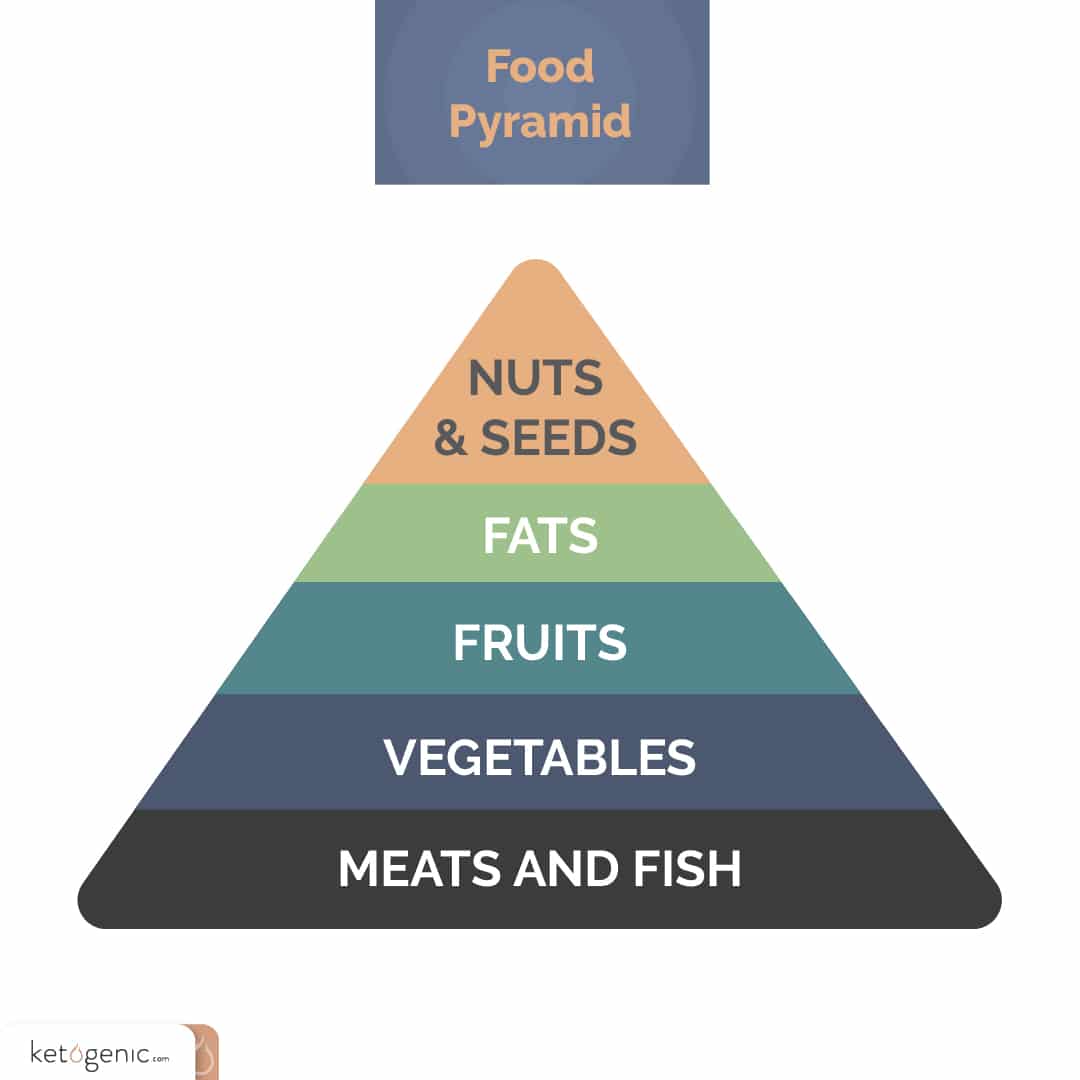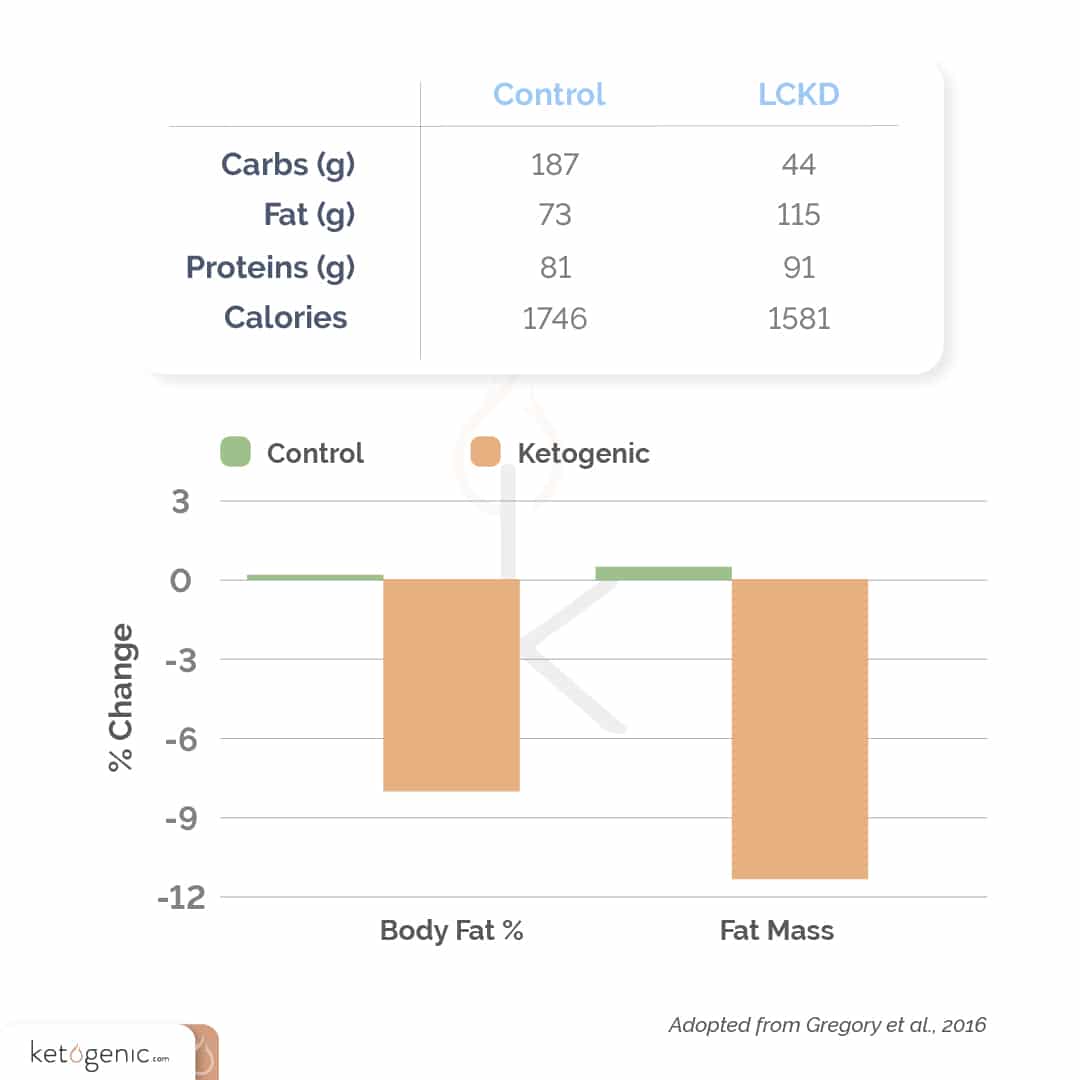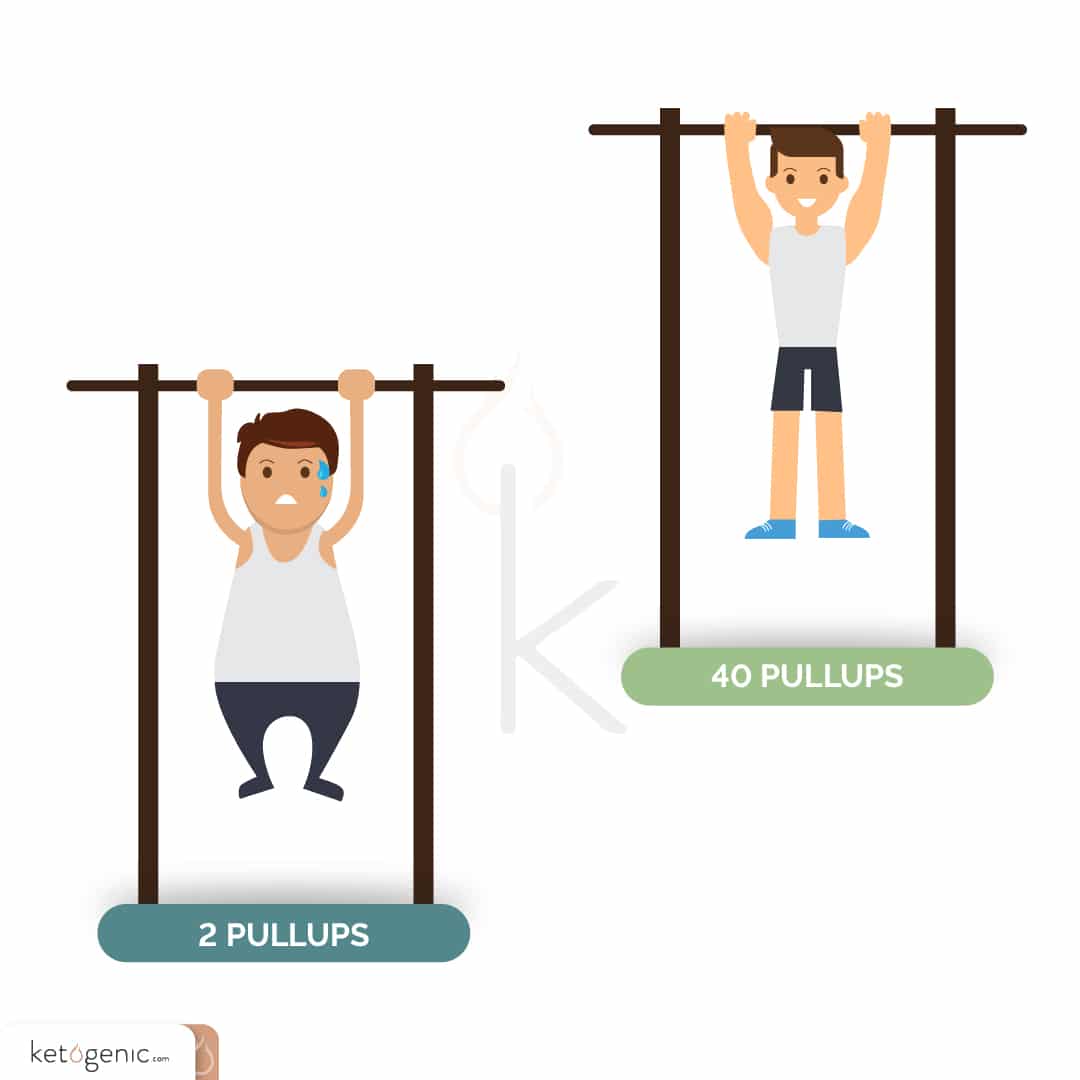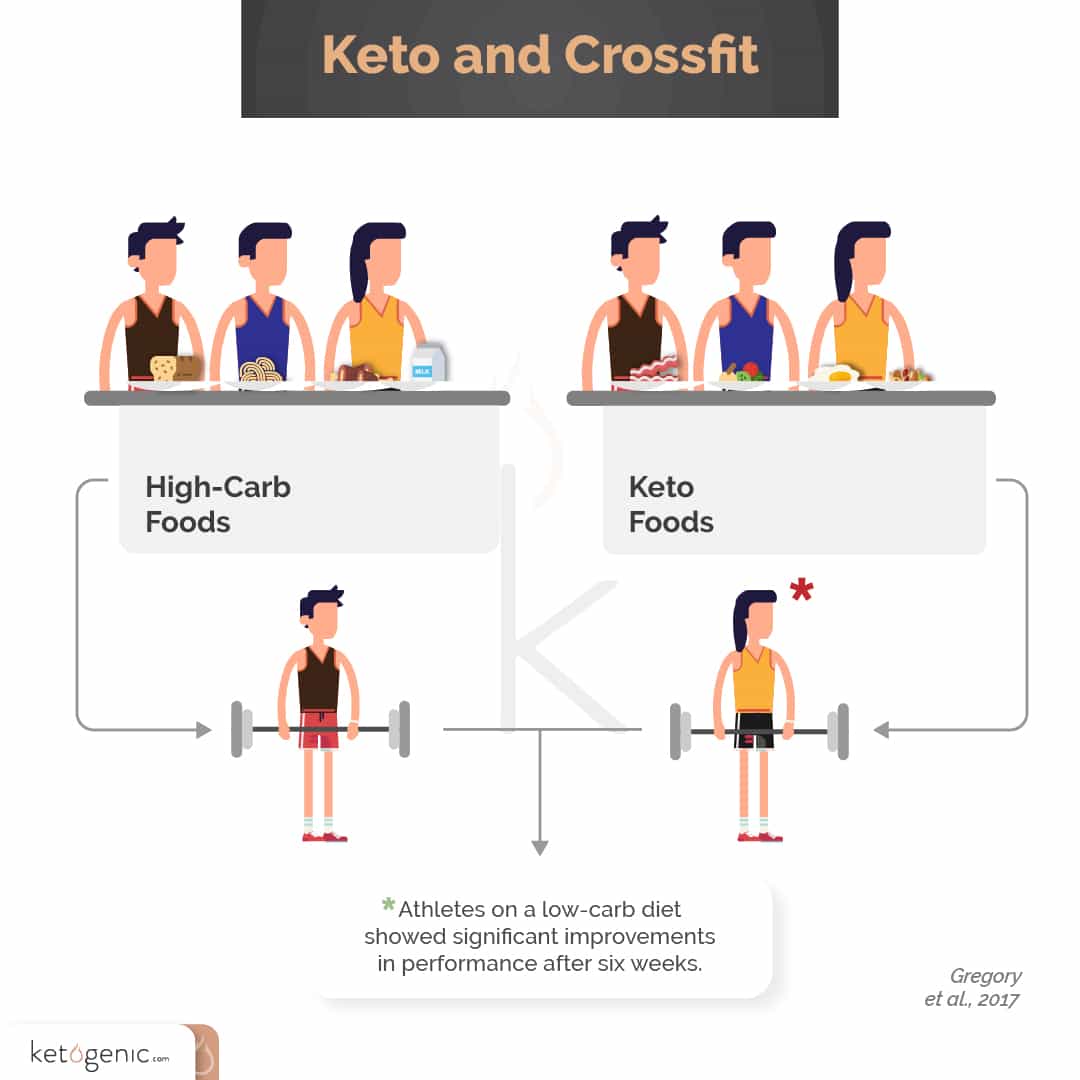
When discussing CrossFit, it is almost inevitable that a conversation regarding the dietary preference these individuals will arise. And no, these athletes don’t tend to eat Cinnamon Toast Crunch or Fruity Pebbles. Heck, if they are willing to take their bodies to extremes, you would think that there would be some acknowledgment from a dietary perspective. One typical style of eating in the CrossFit community is “Paleo.” The Paleo Diet was popularized by Loren Cordain in 2001 and continued to rise with the spreading of education from colleagues like Robb Wolf.
[1] In general, the CrossFit nutritional philosophy is to ‘‘eat meat and vegetables, nuts and seeds, some fruit, little starch, and no sugar.” [2] This back-to-basics approach makes CrossFit and keto a perfect match.
Benefits of CrossFit and Keto
CrossFit-style training has been shown to improve body composition and maximal aerobic fitness in healthy subjects. After 10 weeks of training, body fat levels dropped an average of 4% in males and 3.5% in females. [3] As you can imagine, the physical demand placed on the body during these workouts is high. Training of such an intense nature places a considerable demand on continuous and high glycogenolytic energy production. [4] It is generally thought that an inadequacy in CHO intake during a period of CrossFit training may compromise glycogen repletion, and ultimately performance. As a result, some researchers suggest astronomical levels of carbohydrate consumption, such as 8–10 grams/kg/day for heavily-trained anaerobic athletes. [5] For someone who is 175 pounds, that would be anywhere from 640–800 grams of carbohydrates per day. While research tends to show that there is no scientific reason why anyone would ever need to consume that many carbohydrates, it is eye-opening to see these types of recommendations.
 CrossFit and Keto: A Break from the Norm
CrossFit and Keto: A Break from the Norm
Fortunately, not everyone follows the status quo, and in fact many challenge it to help resolve unanswered questions. Recently, our team at ASPI, along with another group from James Madison University, set out to look at what happens if you do the complete opposite of some of these recommendations. For instance, what would happen if a CrossFit athlete had just 30–50 grams total carbohydrate per day and consumed a high-fat, ketogenic diet instead of having 20 bowls of cereal a day to hit the recommended 800 grams of carbohydrate? One of our thoughts was simple: many CrossFit athletes tend to eat Paleo, and may enter into some state of ketosis during their competition season with the amount of glycogen being utilized and the high-fiber, low-glycemic nature of their diet. So what if we just bumped their fat up a bit and dropped the carbohydrates even further to induce a chronic state of ketosis? Would these athletes be unable to perform? Would they gain fat rapidly from consuming all of that dietary fat? Rachel Gregory and her team at JMU recently presented their findings on a low-carbohydrate ketogenic diet, implemented for six weeks in athletes performing high-intensity power training, as seen in CrossFit. [6] In their study, 31 individuals were randomized into either the control group (their normal diet) or a low-carbohydrate ketogenic diet (LCKD; ad libitum with ≤50 grams of CHO per day) and performed CrossFit workouts four times per week. After six weeks of training they found that: the LCKD group lost an average of 3.5 kg (7.7 lb) of total body mass, 3% body fat, and nearly 3 kg (6.6 lb) of fat mass, as measured by DXA. Now, what about performance? It must have plummeted, right? Wrong. When comparing the two conditions, both groups improved their times over the six weeks to the same degree on various tasks such as rows, squats, sit-ups, pull-ups, etc.
the LCKD group lost an average of 3.5 kg (7.7 lb) of total body mass, 3% body fat, and nearly 3 kg (6.6 lb) of fat mass, as measured by DXA. Now, what about performance? It must have plummeted, right? Wrong. When comparing the two conditions, both groups improved their times over the six weeks to the same degree on various tasks such as rows, squats, sit-ups, pull-ups, etc.
Science Behind CrossFit and Keto
Recently, we teamed up with the research team at Auburn University to investigate physiological responses to ketogenic dieting in CrossFit athletes. We investigated 12 participants who were divided into either a KD group or instructed to continue their normal training regime over 12 weeks. [7] This study was comprehensive in that we looked at DXA-determined body composition, ultrasound muscle thickness, resting energy expenditure, performance, and various blood health markers. Over 12 weeks, DXA-determined fat mass decreased nearly 7.5 lb more in the KD group than in the control group, with no significant differences in lean body mass or performance. Additionally, all of these individuals saw the same improvements in performance.
 Two different labs using a very similar population and finding very similar results is a hallmark of science, and I am sure further studies will continue to replicate these findings. For now, these recent discoveries bring new light to the idea that CrossFit athletes may be able to simultaneously improve body composition and maintain performance while following a ketogenic diet. More studiesneed to investigate this further along with other strategies that may affect performance, such as targeted ketogenic diets, or even exogenous ketone supplementation.
Two different labs using a very similar population and finding very similar results is a hallmark of science, and I am sure further studies will continue to replicate these findings. For now, these recent discoveries bring new light to the idea that CrossFit athletes may be able to simultaneously improve body composition and maintain performance while following a ketogenic diet. More studiesneed to investigate this further along with other strategies that may affect performance, such as targeted ketogenic diets, or even exogenous ketone supplementation.
1. Some research suggests that athletes training CrossFit-style should consume high amounts of carbohydrates due to the energy demand of their sport.
2. Paleo is a commonly used dietary strategy in the CrossFit world.
3. Altering the Paleo Diet by reducing carbs and increasing fat could be beneficial to the CrossFit athlete.
4. New research has displayed not only improved body composition but maintained/improved performance in CrossFit athletes following a ketogenic diet.




 the LCKD group lost an average of 3.5 kg (7.7 lb) of total body mass, 3% body fat, and nearly 3 kg (6.6 lb) of fat mass, as measured by DXA. Now, what about performance? It must have plummeted, right? Wrong. When comparing the two conditions, both groups improved their times over the six weeks to the same degree on various tasks such as rows, squats, sit-ups, pull-ups, etc.
the LCKD group lost an average of 3.5 kg (7.7 lb) of total body mass, 3% body fat, and nearly 3 kg (6.6 lb) of fat mass, as measured by DXA. Now, what about performance? It must have plummeted, right? Wrong. When comparing the two conditions, both groups improved their times over the six weeks to the same degree on various tasks such as rows, squats, sit-ups, pull-ups, etc. Two different labs using a very similar population and finding very similar results is a hallmark of science, and I am sure further studies will continue to replicate these findings. For now, these recent discoveries bring new light to the idea that CrossFit athletes may be able to simultaneously improve body composition and maintain performance while following a ketogenic diet. More studiesneed to investigate this further along with other strategies that may affect performance, such as targeted ketogenic diets, or even exogenous ketone supplementation.
Two different labs using a very similar population and finding very similar results is a hallmark of science, and I am sure further studies will continue to replicate these findings. For now, these recent discoveries bring new light to the idea that CrossFit athletes may be able to simultaneously improve body composition and maintain performance while following a ketogenic diet. More studiesneed to investigate this further along with other strategies that may affect performance, such as targeted ketogenic diets, or even exogenous ketone supplementation.






